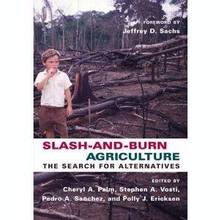Slash-and-burn agriculture
Palm C. Vosti S.
Éditeur : COLUMBIA UNIVERSITY PRESS
ISBN papier: 231134517
Code produit : 1267710
Catégorisation :
Livres /
Science /
Biologie /
Sciences biologiques
Formats disponibles
| Format | Qté. disp. | Prix* | Commander |
|---|---|---|---|
| Livre papier | En rupture de stock** |
Prix membre : 49,91 $ Prix non-membre : 55,46 $ |
*Les prix sont en dollars canadien. Taxes et frais de livraison en sus.
**Ce produits est en rupture de stock mais sera expédié dès qu'ils sera disponible.
Description
Every year about 130,000 km2 of humid tropical rain forest is destroyed. Caused in part by the slash-and-burn practices of both large- and small-scale farmers in Brazil, Cameroon, Indonesia, and elsewhere, the environmental implications of tropical deforestation and its threat to biodiversity and carbon emissions remain a worldwide concern. Yet the small-scale farmers who use slash-and-burn agriculture depend on it to produce food and make a living for their families. Balancing the legitimate interests of rural households and global concerns about tropical deforestation is one of the major challenges of the coming decades. The Alternatives to Slash and Burn (ASB) consortium was formed in 1992 by a group of concerned national and international research institutions to address the global and local issues associated with this form of agriculture. With contributions from agronomists, foresters, economists, ecologists, and anthropologists, this book synthesizes the first decade of ASB's work. It assesses the environmental, economic, and social impact of deforestation and identifies the costs and benefits of alternative uses of forests and cleared land. Throughout the volume, the contributors present new conceptual tools and a rich compendium of empirical analyses needed to formulate viable alternatives to slash-and-burn agriculture.























